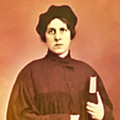Career
Morris gained an MA in Jewish History from McGill University in 1989 before continuing her studies to gain an LLB, also at McGill University, before completing her articles at Blake, Cassels & Graydon in Toronto.
In 1997, she decided upon a career change and left Canada to study rabbinics at Leo Baeck College in London, graduating in 2002.
In the final year of rabbinic studies, she returned to Canada where she served as Rabbi at Har Tikvah, in Brampton, Ontario and Temple Shalom, in Kitchener, Ontario/Waterloo, Ontario from 2001 till 2003.
She became the first female Rabbi in Scotland when she was appointed to the post of Rabbi of Glasgow Reform Synagogue in October 2003. During her tenure, Rabbi Morris was also a Guest Lecturer at the University of Glasgow where she lectured on Judaism.
In January 2012, Rabbi Morris returned to her native Canada to take on a temporary post of Rabbi at Temple B'nai Tikvah in Calgary.
In June 2012, South West Essex and Settlement Reform Synagogue (often referred to by the acronym SWESRS) in London announced that Rabbi Morris had been appointed as their new Rabbi. [1] She began this position in September 2012 [2] and held the role until 2014, when she and her husband returned to Toronto. [3]
Morris strongly supports the egalitarian nature of Progressive Judaism and has spoken a number of times on issues relating to gender equality within Judaism. She was strongly critical of the arrest of Anat Hoffman, head of Women Of The Wall, and publicly wrote to the Israeli Ambassador to the UK on behalf of her congregation about the arrest. [4]
Morris also called on the incoming Chief Rabbi to demonstrate his commitment to repairing divisions between different Jewish traditions by publicly criticising the detention of Emily Wolfson for wearing a Tallit at the Kotel. [5] [6] Morris conducted Wolfson's Bat Mitzvah as Rabbi at Glasgow Reform Synagogue. [7]
Morris presented the Time For Reflection [8] at the Scottish Parliament on 25 June 2008.
Broadcasting
Rabbi Morris was interviewed by Ian Wyatt on his BBC Essex radio programme on which she discussed her career and decision to become a Rabbi. Wyatt also explored her thoughts on the atheist arguments of Richard Dawkins concerning religion. Rabbi Morris explained she feels his arguments focus too much on disputing the literalist interpretation of scriptures as emphasized by religious fundamentalists. Fundamentalism is only espoused by very extremist groups of religious people, and the vast majority of people of faith do not necessarily take such a literalist view of Scripture. Dawkins, in her opinion, fails to address the wider social, emotional, spiritual and cultural benefits for human beings who are devoted to their religious beliefs. Rabbi Morris particularly loves the discussion and lively debate that forms such an important part of Jewish tradition and understanding of Judaism throughout its history. [11]
Rabbi Morris appeared regularly on BBC Radio Scotland's Thought For The Day slot where she presented, from a Jewish perspective, brief talks designed to cause listeners to pause for reflection.
Rabbi Morris also contributed to the BBC radio programme on Matisyahu with her predecessor at Glasgow Reform Synagogue, Rabbi Pete Tobias. [12]
This page is based on this
Wikipedia article Text is available under the
CC BY-SA 4.0 license; additional terms may apply.
Images, videos and audio are available under their respective licenses.
